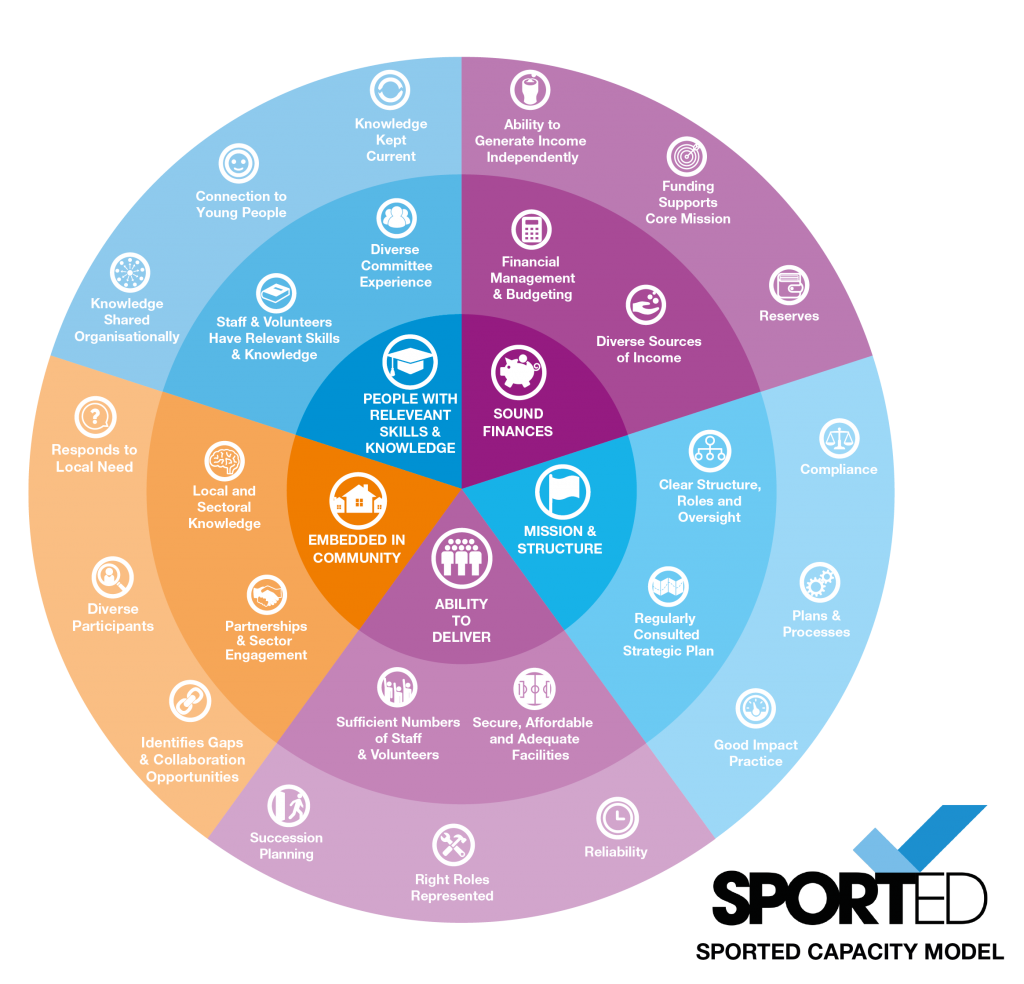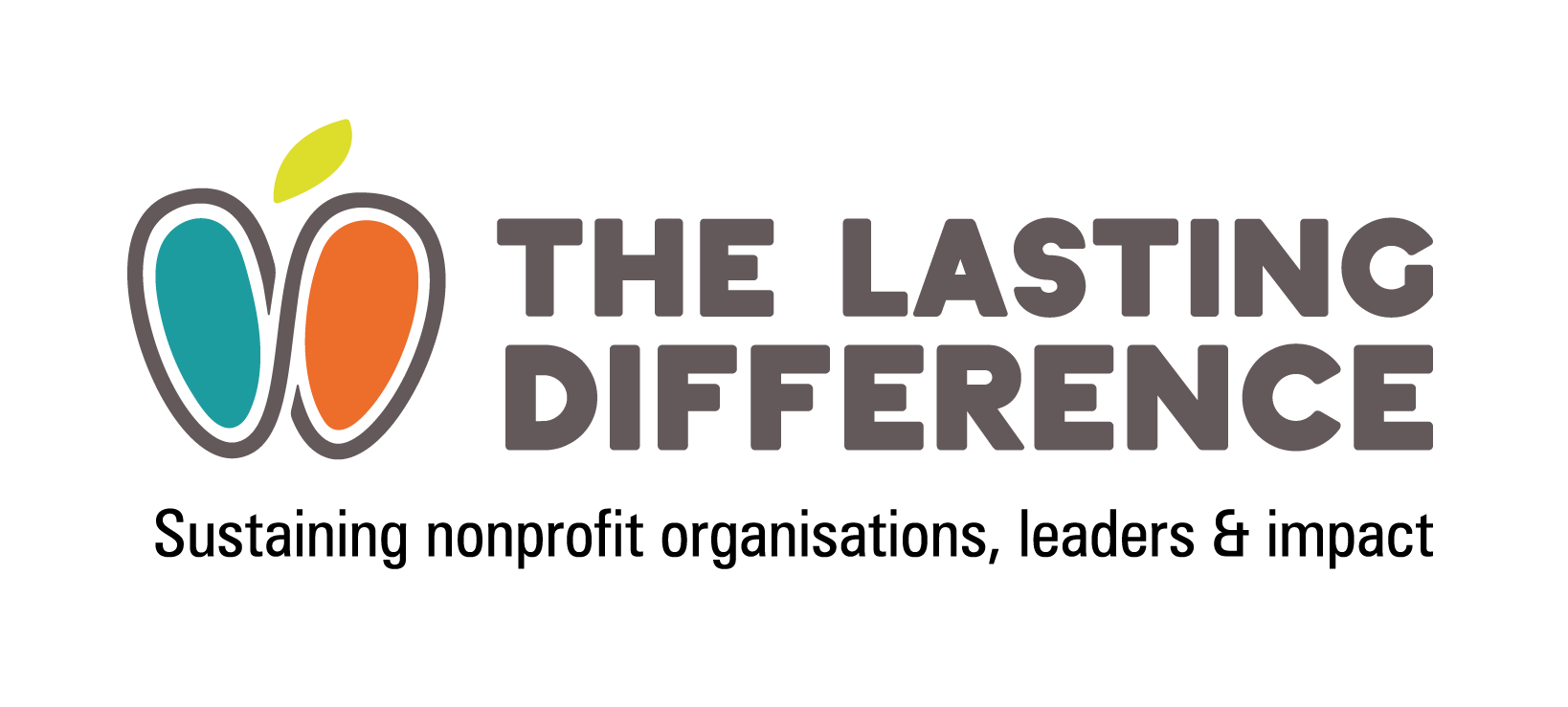Sported have developed a comprehensive model of capacity and sustainability. ‘The Frisbee’ helps the organisation and its members to plan – and evidence the impact of – capacity building support.
It’s very cool, and here’s why.
First of all, it looks good! The layout is visually appealing, but also clever.
 By using a circular graphic, Sported show that there’s no single starting point to sustainability, everything is connected. Working out which capability comes first in terms of sequence or importance was one of the hardest things to crack when I was writing the Last Difference toolkit. Using a circular diagram neatly avoids this problem.
By using a circular graphic, Sported show that there’s no single starting point to sustainability, everything is connected. Working out which capability comes first in terms of sequence or importance was one of the hardest things to crack when I was writing the Last Difference toolkit. Using a circular diagram neatly avoids this problem.
Importantly, the Frisbee isn’t just designed to assess the needs of Sported’s members.
It’s also about understanding them.
This takes place at two levels. Individually, each organisation uses the tool to guide the support it gets from Sported’s input (mentoring, telephone support, workshops etc.). Results are then assessed and then taken forward with the support of a trained ‘facilitator’ (a Sported team member or volunteer business mentor) who can help to crystallize the challenges and provide the most appropriate intervention. In this way, the Frisbee is part of a broader programme of capacity-building support, not just something that can be used in isolation.
By collating these results, Sported generates a national picture of the sustainability of community sports groups across the UK. And because there are ‘before’ and ‘after’ stages to the assessments (fittingly named ‘The Game Plan’ and ‘Time Out’), Sported can also evidence the impact of its interventions. For example, Sported can show that it helped 60% of its members improve their finances, and 70% to improve their knowledge and skills.
In our view, this active and systematic engagement makes the Frisbee the most comprehensive sustainability planning and review tool there is.
Using the Frisbee in everyday practice
Frisbees don’t sit on shelves, they get played with. The tool – and the subject of sustainability – are central to the way Sported works with its members day to day (find out more in this one-page PDF overview). This is fantastic, because it runs counter to the prevailing trend amongst funders and membership organisations that we call ‘Short arms, deep pockets’. Any capacity-building organisation wants to know how its input will improve the capacity and sustainability of the groups that it funds. But very few invest in a sustainability tool of their own.
Sported are to be commended for this. They have set the bar high for other capacity-building organisations to reach.
Having said that, the funders we have worked with to develop similar sustainability tools involved their members and funded groups in writing and designing the tools. Sported involved members in interviews, research and consultation, but there is something special that comes from giving authorship – and ownership – to the sectors we support. However, it’s hard to criticise The Frisbee for this, because ultimately it is used actively by the sector.
So what’s in it?
The Sported Frisbee identifies many of the same capabilities as The Lasting Difference, like the importance of people, partnerships, proving, planning and ‘pounds and pence’. There are some interesting differences though.
Firstly, it’s great to see two specific indicators relating to knowledge (‘knowledge kept current’, and ‘knowledge shared organisationally). Knowledge is often overlooked by organisations when identifying the resources and capabilities they need for implementing their strategies. This is a potentially fatal flaw – knowledge is one of the main resources any organisation needs.
It’s also good to see ‘diverse participants’ as an indicator in its own right. This will be based on evidence of the ideas, energy and perspectives that different people bring to an organisation’s work. (When I was a volunteer coordinator, the biggest organisational benefit of having volunteers was the diversity they gave us, giving us fresh ways to think about things).
Finally, it’s interesting that ‘compliance’ features as an indicator but innovation doesn’t. Compliance might be a way of framing ‘quality’ or ‘effectiveness’, but the word conjures up ideas of fitting in and box-ticking. Obviously compliance with legislation and quality standards is vitally important. But I wonder if there’s room for innovation within the model too. Sustainability isn’t just about fitting in to established standards, it’s about learning and adapting too.
Summing up
Sported have done a brilliant job with their Frisbee model, not just helping themselves and their members learn and improve, but giving everyone else a new benchmark for thinking about how to develop and support sustainability.
Review by: Graeme Reekie, author of The Lasting Difference. With thanks to Campbell Roy and all at Sported for sharing the Frisbee with us and giving us permission to share it with others. Visit the Sported website here.
Got a resource to share? Contact us and join in.
